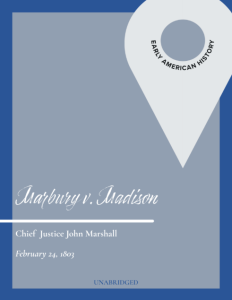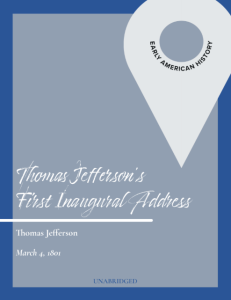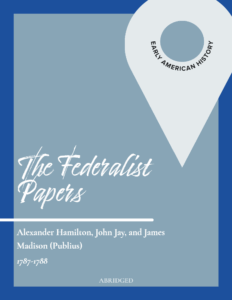
Federalism is the separation of power between the national government and states.


Capital determines whether a society will be prosperous or poor, well-fed or not, populated by independent and self-reliant citizens or dependent subjects. An abundance of nutritious food, clean water, sturdy homes, safe modes of transportation, reliable sources of heat and power, modern medicines, and many other products and technologies that improve the quality of human life are impossible without capital.
A teacher can help students understand what capital is by encouraging them to think of capital as an individual’s “starter pack” for being productive and getting things done. Capital includes the tools, money, and other valuable resources a person needs to create something of value, or to solve a problem in order to create wealth.
For example, if you wanted to start a lemonade stand, the money you use to buy cups, lemons, water, and a sweetener is capital. While money is an important form of capital, capital can include other resources that help you create wealth for yourself by producing value for others.
Other Kinds of Capital:
Capital is anything you can use to “build” something that will provide experiences of value for other people. Money is the most obvious example of capital, but creativity, friendships, and even your honesty and intelligence, can be just as important, maybe even more important in some circumstances.
So, yes! Capital is cash and more: Capital includes any resource that helps you be more productive. Ask students: What kinds of capital do they have? Maybe it is their energy, ideas, or even their ability to make people laugh. Remind them that everyone—even people with little or no money—have important capital over which each person has much control: A person’s own reputation, honesty, and trustworthiness.
Evaluating incentives
One of the most important questions within any society is: Who will allocate capital? One possibility is that individuals choose whether, how, when, where, and why to spend their own money and invest their own capital. Another option is that political elites within government will tax citizens and confiscate the wealth that others have created, and then those in government will choose how to allocate other people’s their capital.
Individuals choosing how to invest their own capital have strikingly different incentives than politicians and bureaucrats in government spending other people’s money.
As we discuss in another section, profit is the happiness of other people. When individuals and business owners make their own choices about how to allocate and when to invest their own capital, they aim to earn a profit—they want a return on their investment—which is another way of saying they’re trying to make other people happy by producing value for them.
When those in government choose how to spend other people’s money, they serve their own interests, usually by expanding the scope and power of government. That is worth repeating: Business owners allocate their own capital in order to make a profit for themselves by making other people happy; government allocates other people’s capital in order to extend the power and control of government.
Every new government spending program, after all, requires expanding the class of unelected bureaucrats, adding new levels of control over what citizens may do, and adding new kinds of taxpayer-funded government competition to businesses and other private organizations.
Incentives of Allocation
For politicians and bureaucrats, resource allocation often means achieving political ends or aiming for short-term gains. Without direct knowledge of costs or profits, these decisions can be quite unpredictable.
When private individuals choose how to invest or spend their own money, they have strong incentives to make careful, strategic decisions. If they invest wisely, they personally reap the rewards; if they invest foolishly, they suffer the losses. This direct link between decisions and consequences encourages efficiency and accountability. Individuals are motivated to seek the highest return (or best use) for their funds, and they also bear the risk of losing their capital if a project fails.
By contrast, when those in government take capital from citizens through taxation, politicians and bureaucrats end up allocating resources that are not their own. As a result, several distortions can arise:
In short, when individuals allocate their own funds, they have personal incentives—financial risk and reward—to be careful stewards of their capital. When governments collect taxes and decide how to spend them, officials are allocating other people’s funds and often do so under weak or no incentives for efficiency, with less direct accountability for mistakes, and with political or bureaucratic considerations that can overshadow the goal of maximizing societal well-being.
 Nº1
Nº1
Description
Download PDF Download ePub Button 3
In the discussion of the Key Idea of competition, we explained how competition produces excellence. The United States Constitution features federalism, which is important for several reasons, one of the most important being that it incentivizes competition between and among states—and competition produces excellence.
Federalism is the division of power between the national (or federal) government and state governments. Federalism is a cornerstone of the U.S. Constitution designed to prevent tyranny, promote innovation, and ensure accountability.
By dispersing power, federalism creates a dynamic system where states and the federal government check each other’s power while fostering competition among states. Competition driven by mobility of citizens (they can move from one state to another), businesses, and resources, serves as a safeguard against abuses of power and incentivizes good governance at the state level.
Federalism’s primary benefit is its structural defense against concentrated power. By reserving certain powers to states (e.g., education, criminal justice, and infrastructure), the Constitution ensures no single entity monopolizes control.
Decentralization forces states to act as laboratories of self-government, a concept Justice Louis Brandeis famously described, where they experiment with policies tailored to local needs. If one state adopts a good policy or law, other states can do something similar. Conversely, if one state adopts a policy that turns out to be disastrous, the damage is limited to one state rather than the entire nation.
Federalism’s genius lies in its creation of a competitive “marketplace of governance.” States compete to attract residents, businesses, and investment by maintaining fair laws, efficient public services, strict protection for property rights, and responsive policies.
If a state imposes oppressive regulations or excessive taxes, individuals and companies—especially those with capital—can relocate to states offering better, freer conditions in which to live. This mobility pressures states to avoid abuses—such as overreach in taxation or infringement on civil liberties—and prioritize transparency and justice under the laws.
Competition compels states to improve services and policies to remain attractive. States with robust education systems (e.g., Massachusetts) or business-friendly regulations (e.g., Texas) often outperform others economically, creating a ripple effect as neighboring states adopt similar strategies. This rivalry also encourages fiscal responsibility: States balancing budgets without excessive debt (e.g., Utah) set benchmarks for others. Conversely, states failing to address corruption or inefficiency—such as Illinois’ pension crises—face population decline and economic stagnation, reinforcing the need for accountability.
In centralized national systems without state autonomy, governments face fewer incentives to innovate or address local needs. For example, unitary nations like France historically struggled with regional disparities, as top-down policies often ignored local contexts. By contrast, U.S. federalism allows states to address unique challenges, while the threat of citizen mobility ensures accountability.
Federalism’s competitive framework transforms governance into a self-correcting system. States, aware that their residents and resources can leave and move elsewhere—and take their votes and capital with them—are pushed to govern justly and efficiently. This dynamic not only checks abuses but also cultivates a culture of responsiveness and creativity, proving that competition among states is as vital to republican self-government as the separation of powers itself.



